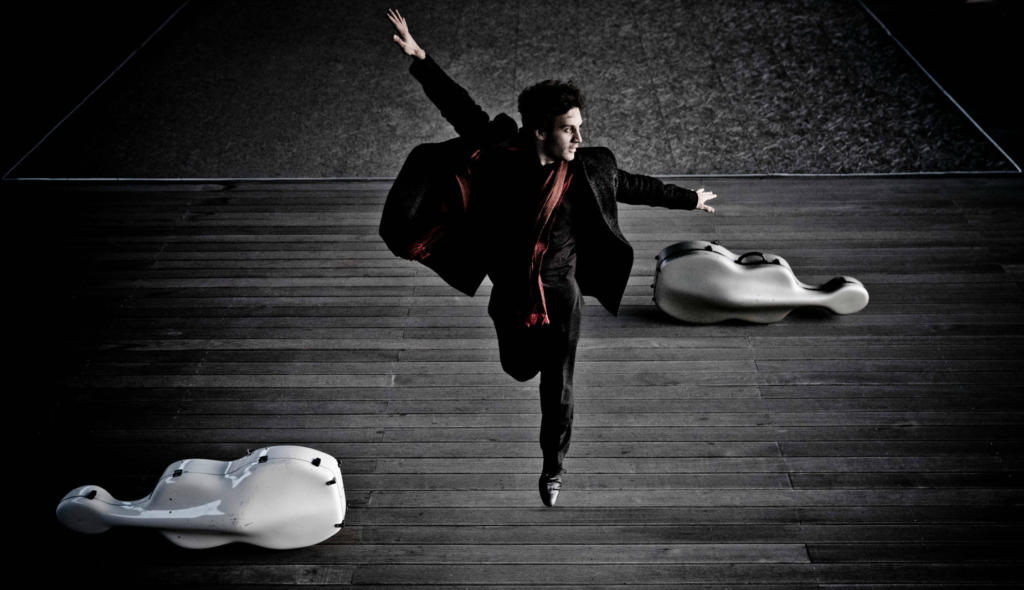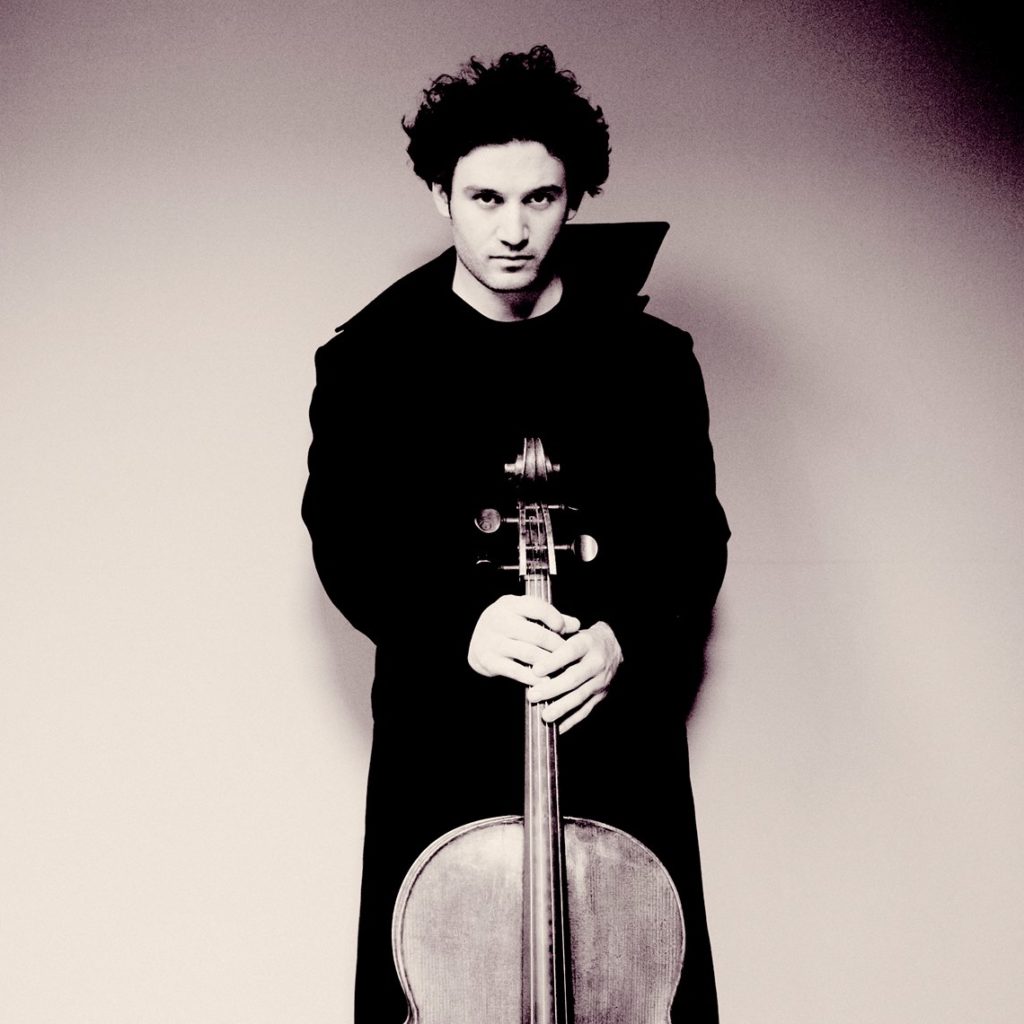Nicolas in the Underworld
Interview
Cellist Nicolas Altstaedt comes to Kings Place as both soloist in
Haydn’s first concerto and collaborator in a new work inspired by a film
Fellini planned but never made. Helen Wallace hears the story.
‘The cello – it’s a physical addiction, I’m bound to it.’ If you’ve seen Nicolas Altstaedt play, you can believe it. In a field where empty superlatives abound, the German-French cellist astonishes with effortless mastery. On stage, as in person, he exudes a dark, mercurial energy, the instrument apparently a natural extension of himself. But, he’s quick to point out, music comes first, the cello is merely a tool, a key to open worlds of art and meaning.
‘I’ve always been driven by an urgent need to find the connections – between composers, philosophers, artists, writers.’
He is that rarest of musicians, one who excels both in historically informed performance and in modern. In one recital I simply couldn’t believe he hadn’t swapped instruments to play Bach and Dutilleux: on each he created utterly distinct musical worlds; it was as if a completely different cellist emerged on stage, one light, articulate, steeped in Baroque rhetoric, the other dazzling with high-octane extended techniques. In fact, as he showed me afterwards, all had been achieved on his gut-strung 18th-century Gigli cello, with a mere change of bow.
Having performed with gut strings since he was very young – Jonathan Cohen of Arcangelo is a long-time collaborator – he has never felt the need to ‘choose’ a specialty: ‘I’ve never wanted to limit myself. When I was a boy I was fascinated by Anner Bylsmer and Nikolaus Harnoncourt, and I always wanted to experience the sensation of playing on gut strings. But I don’t want to get stuck into playing in one way: it’s not about schools and rules. Just read CPE Bach (whose concertos he has just recorded with Cohen): it’s all about taste, sensitivity, different ways of arriving at the truth. The important thing is to understand the language of the music, a way of feeling it, that overrides any particular type of instrument. The paradox today is that we have cellists playing Shostakovich on an 18th-century steel-strung cello, and ‘Baroque’ cellists playing Bach on a replica made a couple of years ago – how can we talk about authenticity?’

In May, for Cello Unwrapped, he’ll play Haydn’s First Cello Concerto with the English Chamber Orchestra, a captivating work of which he never tires: ‘Haydn did something completely new. While the first movement glances towards the Baroque concerti, there’s a visionary feel to the slow movement which looks forward to the Romantic era, and in the finale the cello soloist adopts a fabulous coloratura-type virtuosity, like a star opera singer.’
But Altstaedt is more than a virtuoso. In 2012 Gidon Kremer asked him to take over as director of the Lockenhaus Festival in Austria, which has put him at the centre of Europe’s musical élite: he regularly works with Janine Jansen, Lawrence Power, Antoine Tamestit, Pekka Kuusisto and Vilde Frang, with whom he shares a flat in Berlin. He’s also collaborated widely with composers, including Bryce Dessner, Jörg Widmann, Fazil Say, Nico Muhly, Thomas Ades and, most recently, Hauschka, the enigmatic prepared-piano artist and composer, who was once in a hip-hop act called God’s Favorite Dog.
It’s with Hauschka (aka Volker Bertelmann) that Altstaedt will make his debut at Kings Place in April, giving the UK premiere of Lost, a work inspired by a film Federico Fellini planned in 1965 but never made, The Last Journey of Giuseppe Mastorna. Nicolas takes up the story: ‘I discovered the script two years ago. It was inspired by an emergency landing Fellini made in a snowstorm in New York – he was in shock, and deeply troubled, and he immediately created this story about a cellist who makes a sudden landing flying between Florence and Hamburg, and he finds himself in the shadow of a Gothic cathedral, intended to be Cologne. He wanders around, not knowing where he is, sees familiar places, friends keep appearing, he tries to phone home – but at some point he realises he is dead.’

‘Altstaedt leads us through a labyrinth, in frantic flight, then dreamy limbo’
Fellini had story-boards made for the scenario, and a producer set to work. Legendary actor Marcello Mastroianni even freed himself to play the main role – ‘Mastorna’ was an elision of ‘Mastroianni ritorna’. But Fellini couldn’t forget a prediction he heard that this would be his last film, and superstition forced him to drop the project. What particularly drew Altstaedt to the story was the idea of a musician in limbo: ‘That image of a cellist arriving somewhere in the world, not knowing where, trying to find something to ground him, has a real resonance for me. My experience feeds into this: we all have to perform for a short time in different places in different time zones in front of a fresh group of strangers. Then we move on. After a while you’re not sure if you exist anymore when you’re not rehearsing or performing on stage: who am I when I’m not expressing music, where and to whom do I belong?’
Altstaedt felt strongly that the story was awaiting a home, with the cello as protagonist. He was introduced to Hauschka by Pekka Kuusisto at a music festival in Finland, and discovered that the composer-pianist had taken his alias from an 18th-century Bohemian cellist, Vincent Hauschka, and had always wanted to compose for the instrument. The stars were aligned. ‘I felt that the sound-worlds he creates from inside the grand piano with his fresh, unpretentious way of “preparing” it could create the ineffable, mystical world of the film. I gave him the book and he has taken key words or phrases to create individual scenes from the story.’
Encountering the work at its premiere at the Vivacello Festival in Liestal, Switzerland, it was clear that Hauschka had created a vivid dramatic persona for Altstaedt and his cello, who leads us through a mysterious labyrinth, sometimes in frantic flight, then dreamy limbo, images and harmonies blurring in and out of focus, with Hauschka directing from the piano. As Altstaedt puts it, ‘I wanted it still to smell of the cinema, that’s an important aspect.’ Lost will evolve again before finding a home in Hall One this April: what won’t change is the charisma of its soloist and its creator.